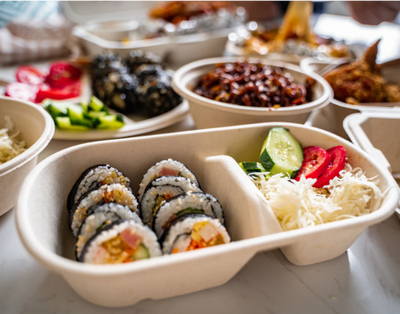It’s undeniable: the world is drowning in plastic. Pollution creates a permanent filter over our oceans; poisoning our wildlife and damaging our environment. Such drastically dire consequences for the simple fact we are using too much single-use plastic. Single-use plastic is any plastic that is only used once before being thrown away - including straws, coffee stirrers, plastic bags, and water bottles. It’s estimated that we use around 500 million plastic straws daily – and that’s just one variation of single-use plastic!
Fortunately, more and more countries are initiating single-use plastic bans. This is a massive victory in the fight against plastic pollution, but it’s only the first step. To find out more about the single-use plastic ban and what you can do to help, keep reading!
Why Should Single-Use Plastic Be Banned?
Single-use plastic is a significant contributor to environmental pollution and must be banned - it is easy to understand why this material needs to go. Not only does it create unnecessary waste, but it also poses a risk to animals and marine life when it permanently ends up in our oceans.
Single-use plastic items are specifically designed for one-time use. They are usually made from polyethylene, which takes centuries to decompose. This means that the amount of single-use plastic currently in circulation will likely remain on the planet for generations - unless something drastic is done. The persisting statistics of the large quantities that take up space in landfills and are made from non-renewable sources are the main catalysts for their high contribution to climate change.
What's more, these items are often carelessly disposed of or littered, winding their way into drains and rivers, and eventually making their way into our seas where they pose an even greater threat.
Single-use plastic is made from non-renewable sources such as oil and gas, which are limited resources and contribute to climate change when burned. These items are often used just once before being discarded, which creates needless waste and causes excessive and unnecessary strain on the environment throughout their lifecycle.
A ban on single-use plastic can help reduce the amount of plastic waste produced each year and protect our planet’s health. Banning these products encourages consumers to switch to more sustainable alternatives, like reusable bags or containers made from glass or metal instead.
Additionally, on a larger scale, your business may also invest in switching to biodegradable and compostable products (such as natural straws, or biodegradable utensils). Providing incentives for customers who choose eco-friendly options over disposable ones is another way to spread your eco-friendly message.

Source: Internet
>> Read more:
- What Is Climate Change: Causes, Impact on Humans and Animals
- What is Net Zero: Importance, Roles of Individuals and Organizations
- What’s So Wrong With Plastic Straws? Exploring Their Disadvantages
- Exploring The History Of Plastic
Countries and Cities That Have Banned Single-Use Plastic
The increasing environmental damage caused by single-use plastics has led to many countries and cities banning its use. These bans on single-use plastic are progressively more common as the world's population is becoming more aware of the effects of plastic waste on nature. Many countries have already responded by banning these single-use plastics entirely to reduce pollution and protect their environment. Let’s uncover some of the countries and cities that have applied a single-use plastic ban!
Single-Use Plastic Ban in Canada
As of December 20, 2022, Canada has banned the import and manufacture of single-use plastic checkout bags to reduce waste and protect the environment. The ban applies to all provinces and territories across the country.
The move towards banning single-use plastics has brought Canadians together with strong public support for this initiative. Communities are now looking at other opportunities for reducing plastic consumption, including reusable containers, eco-friendly packaging options, and compostable alternatives.

Source: Internet
Single-Use Plastic Ban in the EU
In 2018, the European Union (EU) took a major step toward reducing plastic pollution when it passed the Single-Use Plastic Ban. This ban prohibits the use of 10 throwaway plastics, including Styrofoam and single-use straws. The goal of this ban is to cut down on plastic waste and reduce its impact on the environment.
From July 2021, another single-use plastic ban was applied, stating single-use plastic products, including plates, cutlery, straws, balloon sticks, and cotton buds, can no longer be placed on the markets of EU Member States. This ban is part of the European Green Deal, which aims to make Europe’s economy sustainable by 2050. To reduce waste and pollution, countries are encouraged to use more sustainable alternatives such as paper or biodegradable materials for their needs.

Source: Internet
>> Read More:
- The Best Eco-Friendly Alternatives To Plastic That Makes Your Life Greener
- Why Should You Choose To Use Reuseable Straws? Pros & Cons From EQUO
- 7 Best Types Of Biodegradable Straws: Eco-Friendly & Compostable
- Compostable Vs. Reusable Straws: Which One Is The Best Eco-Friendly Alternative
Plastic Bag Bans in Australia
Plastic is one of the main sources of pollution in Australia, as it contributes to larger-scale environmental destruction. In a bid to reduce this issue, the Australian state of New South Wales - the most populous state in Australia - has enacted a ban on single-use plastic items like straws, cutlery, and bowls.
This influential ban will come into effect from November 1. Retailers providing plastic bags must make sure that they are 100% compostable and biodegradable or face a hefty fine. The government is also encouraging retailers to discontinue offering these plastic items all together as part of their strengthened efforts to fight against climate change and reduce pollution.
The aim is for New South Wales residents to adopt more sustainable habits when it comes to daily items like shopping bags and cutlery – ultimately resulting in less waste being produced across the state.
To cope with this regulation, you can opt to use eco-friendly shopping bag made from reusable materials like cotton. Otherwise, consider eco-friendly biodegradable straws & utensils made from 100% natural ingredients.

Source: Internet
Plastic Straws and Bags Ban in California
California has been a leader in enacting laws to reduce the amount of single-use plastic products that end up clogging landfills and polluting the environment. In 2014, this state became the first in the US to pass a law banning single-use plastic bags from large grocery stores.
Four years later, in 2018, California went even further by becoming the first state in America to implement a partial ban on single-use plastic straws. This was done as part of a larger effort to reduce pollution and protect marine ecosystems. The straws are still available upon request at restaurants and other establishments, but this has resulted in a dramatic reduction in their use since they’re no longer given out automatically with drinks.
To cope with the law, you are encouraged to start using drinking straws made from reusable materials like bamboo or glass. Another option is to opt for biodegradable compostable straws made from 100% natural ingredients like EQUO’s eco-friendly straws.
Should you be a business owner, EQUO also has wholesale deals for you to choose from!

Source: Internet
>> Read more: 5 Benefits Of Using Biodegradable Drinking Straws
Bangladesh Plastic Bag Ban
Bangladesh was the first country in the world to ban plastic bags in 2002. The law, enacted by the then-government of Prime Minister Khaleda Zia, prohibited retailers from using plastic bags for shopping and packaging due to their environmental impacts.
The ban has been largely successful, reducing both plastic bag litter and its attendant health risks. It has also led to an increase in public awareness about these issues; more people now understand how serious a problem plastics can be for our environment. Bangladeshis have embraced sustainable alternatives such as jute or cotton bags and newspaper packets as a way of their natural daily life.
Overall, the ban on plastic bags is a success story that other countries should model their own after when seeking ways to reduce their reliance on single-use plastics and lessen their environmental impact.

Source: Internet
Single-Use Plastic Ban in India
In a move that is being applauded by environmentalists, India has announced a ban on single-use plastics starting in July 2022. The ban will cover the production and use of plastic items such as bags and cups that are intended for only one-time use.
The government hopes to reduce the amount of plastic waste in India and promote sustainable alternatives. In northeastern states, bamboo-based alternatives are being promoted to replace single-use plastics.
In different regions sugarcane leaves, leaves, and other natural materials are being used to produce plates, straws, and other products instead of plastic. In some places, booths have been set up where plastic and water bottles can be exchanged for money, gift cards, and free food.

Source: Internet
>> Read more:
- Best Non-Plastic Straws For Hot Coffee & Other Hot Drinks
- 8 Best Plasticless And Biodegradable Plant-Based Straws
- 10 Best Eco-Friendly & Reusable Straws For A Better Environment
- Compostable Straws: Plant-Based Straws Versus Paper Straws
China Single-Use Plastic Ban
Since 2021, China has implemented a strict nationwide single-use plastic ban, being the latest of their efforts to reduce plastic pollution and protect the environment. Major cities throughout the country have begun banning single-use plastic bags, utensils, and straws from shops, restaurants, and other businesses. These requirements are part of a larger effort to create a cleaner, greener future for China.
The main goal of this nationwide ban is to reduce waste by encouraging people to reuse items or use biodegradable products instead of relying on disposable items that are made from plastic materials. This will help create a more sustainable economy and environment for future generations. Additionally, it will help reduce carbon dioxide emissions as well as water consumption due to reduced plastic production methods.

Source: Internet
Ban on Single-Use Plastic in the UK
The UK has placed itself outside the EU and is therefore not subject to the bloc's regulations on single-use plastic bags. Despite this, Scotland and Wales each decided to voluntarily adhere to some of the EU's regulations, so a number of restrictions have been imposed across the United Kingdom.
These are currently focusing on banning plastic cutlery, straws, sipper covers, plates, and Styrofoam containers. Recently, the UK took measures to ban face scrubs and toothpaste that contain plastic microbeads.
In order to cooperate with this ban, you can look into using biodegradable products. Choose an eco-friendly brand that provides biodegradable, compostable, as well as reusable products for everyday use.

Source: Internet
Single-use plastics are unignorable trouble-makes for our environment. They take hundreds of years to decompose whilst polluting our precious oceans and land. However, there are some simple ways to reduce your single-use plastics. One effective way is to use eco-friendly products from EQUO! Our products are made from sustainable materials and are either compostable or biodegradable. Let us give our best to the Earth so we can enjoy the best in return!
Contact Information:
- Website: https://shopequo.com
- Fanpage: https://www.facebook.com/equointl
- Twitter: https://twitter.com/equointl
- Linkedin: https://www.linkedin.com/showcase/equo-international/
- Instagram: https://www.instagram.com/equointl/
References:
https://www.marineconservation.org.au/which-australian-states-are-banning-single-use-plastics
https://byndgrn.com/blogs/news-1/california-s-straw-ban-everything-you-need-to-know
https://www.npr.org/2022/07/01/1109476072/india-plastics-ban-begins
https://commonslibrary.parliament.uk/single-use-plastic-how-do-bans-differ-across-the-uk-and-eu/
Tags: eco compostable straws, biodegradable straws, compostable straws, compostable drinking straws, buy biodegradable straws, where to buy biodegradable straws


